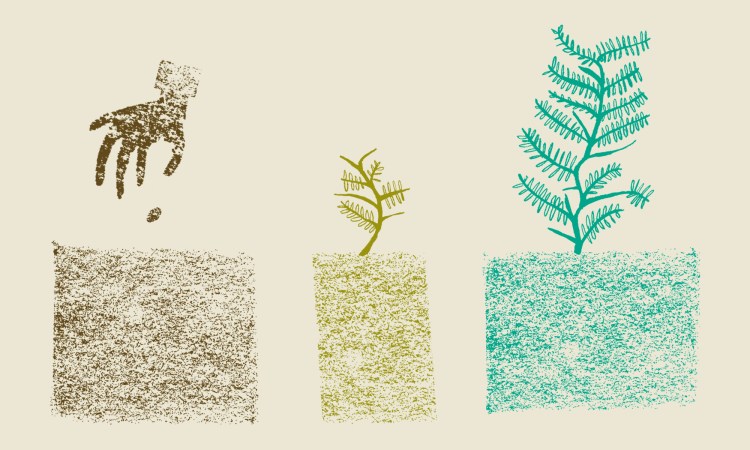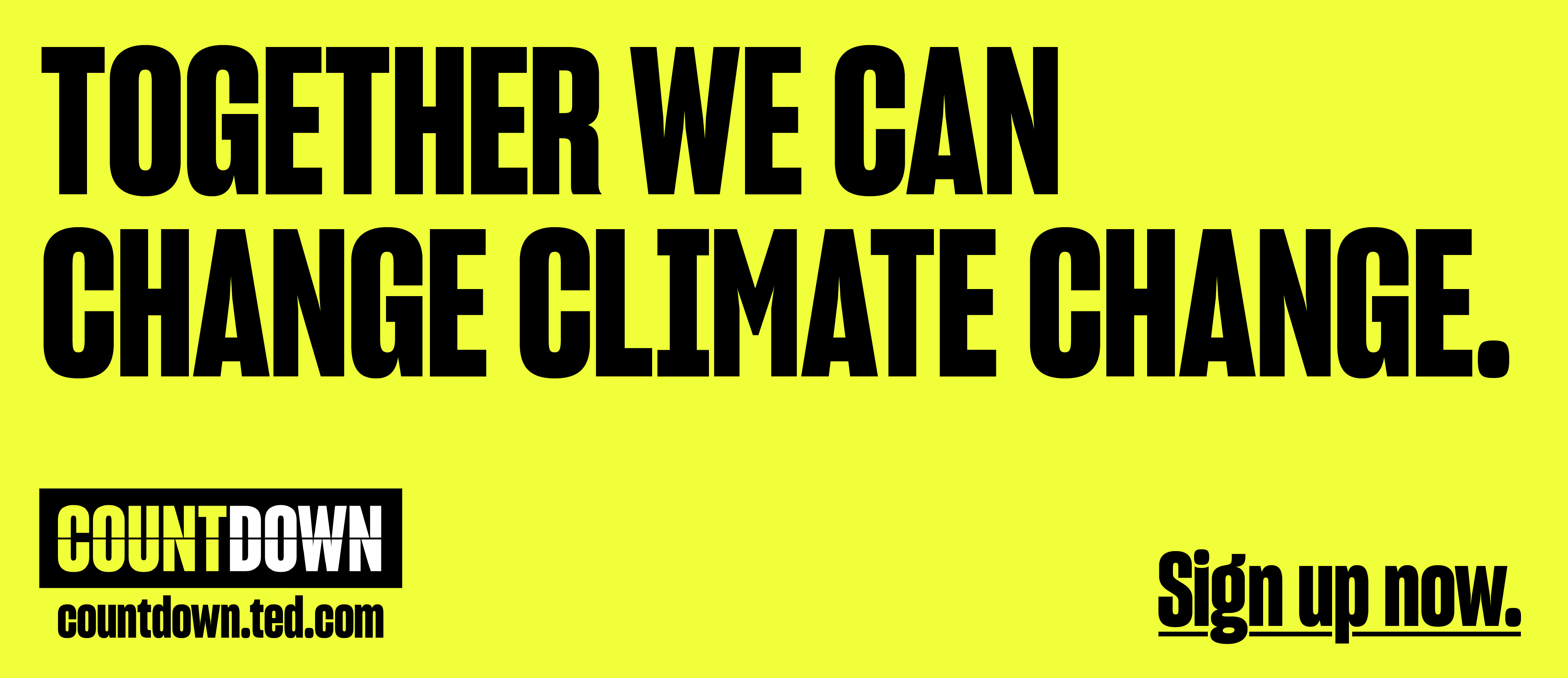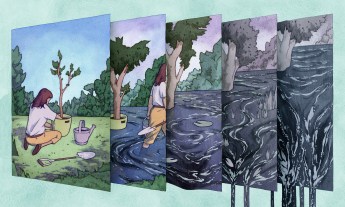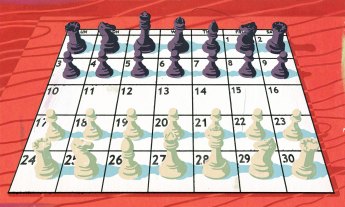
Yes, it takes enough time and energy to be a good person in the here and now, but we also need to start considering future generations, too. Writer Bina Venkataraman tells us how we can start acting in ways that benefit those to come.
We live in a culture that encourages instant gratification, amid markets that turn on quarterly profits. Yet many of us today long to think past the immediate moment, and we want our lives and work to have meaning over time, even beyond our own lifetimes. For societies, it’s never been more important to think ahead to future generations. We need to prepare for future threats — an even-warmer planet and growing inequality — and to invest in the future — to reinvigorate cities, protect the food supply and find cures for disease.
One myth that has pervaded public dialogue is that this kind of long-term concern for the future is not an inherent trait of humanity — that we as a species are hopelessly and irredeemably shortsighted. I think that view underestimates our potential and neglects our obligations; my TED Talk and book The Optimist’s Telescope are about the practices we can adopt to reclaim foresight in a reckless age.
So, how can we become better ancestors — both in our own lives and collectively in society? My efforts to answer that question took six years and brought me all over the world, from farms, fishing villages and VR labs to nuclear fallout zones, corporate boardrooms and stock exchanges. I’ve gleaned research from a wide range of fields, including evolutionary biology, land-use law, behavioral economics and archaeology, in order to understand what’s possible in our families and businesses — and to find out what’s most critical for the future of our communities and societies.
Here are three key insights I gained from my research:
1. It’s not enough to predict the future — we need to imagine it.
Our tools for predicting the future, whether it’s the upcoming weather or an outbreak of a disease, are rapidly evolving with the ubiquity of data collection and the growing sophistication of analytical methods to detect patterns from the past which can shed light on what’s to come.
But I’ve found that prediction only gets us so far. Most of us won’t act on the forecasts we receive without fully inhabiting the experience in our minds — that is, unless we can vividly imagine the future. Moreover, the distant future isn’t easy to predict because of how society is being remade by technology. In the absence of certainty, we still need the ability to act on our concerns for the long-range future because we are implicated in it, not least through our emissions of carbon dioxide and our leftover nuclear waste.
How can we start to practice imaginative empathy? At the personal level, we can do this by writing letters to our future selves, our children and our grandchildren (like this project, DearTomorrow) to help guide our decisions as voters. On the collective level, our imagination can be aided by practices including role-playing games such as those long used in the Pentagon and by drawing on multiple historical precedents to expand our view of what is possible. To take better account of the lives of future generations, institutions and organizations should consider using these tools in place of antiquated practices such as social discounting and simple scenario planning, which do not activate our senses and emotions sufficiently to motivate us to account for the future.
2. Seek out and listen to the voices of the future.
When we bring young people into our conversations and deliberations — whether in our families or in public discourse — they can remind us of our role as ancestors. They have the moral authority to speak on behalf of future generations, as well as the credibility to lead their elders. We witnessed this phenomenon with the teenagers who survived the school shooting in Parkland, Florida, who asked their parents and lawmakers to pledge to support gun control. We’ve also seen it with the young people — like Greta Thunberg — who are protesting and implicating their governments for their role in accelerating climate change.
To hold ourselves accountable for acting like better ancestors, we’d be wise to ask the young people we know to be more vocal about what matters and to listen to them around dinner tables and conference tables. Within governments, ombudsmen, special councils for future generations, and youth representatives can play this role as long as they’re given enough clout and protected from short-term political influence. This approach has been tested around the world, including in the US, Finland, France and Israel — and we can learn lessons from what’s worked and failed in the past. When we vote in elections and invest in companies, we ought to put the interests of the youngest living generation at the top of our priority lists.
3. Leave behind heirlooms, not legacies.
As you think about the future beyond your immediate lifespan, try to resist the urge to leave behind a vanity project, such as a bench (or building) with your name on it. That kind of gesture is often invoked near the end of a person’s life and while it seems a generous way to give back, that object ends up being a static, isolated fixture in the world.
A more meaningful way to give to the future is to think bigger and leave behind something that can be stewarded — and used and adapted over time — as an heirloom. This means leaving behind resources with an eye to how they might endure for multiple generations, without prescribing too narrowly what each generation does with them. A fund containing principal which can grow and keep creating capital to educate young people might better adapt to future students’ needs than a particular facility or building, for example. The recipient of an heirloom (as opposed to the recipient of a bequest or gift) carries the obligation to steward the resource for the generations that are yet to come and to use it without completely depleting it.
An even better move for us as future ancestors is to go beyond our families or tribes when we’re considering our legacies and embrace a broader view of community and humanity in what we choose to pass along. Your grandkids, after all, will share the planet with the grandkids of Cameroonian subsistence farmers and indigenous people of the Brazilian Amazon. Such shared heirlooms are the hallmark of great ancestors — from the architects of The US National Park System and UNESCO World Heritage sites to the keepers of the continually-rebuilt Ise Shrine in Japan, a structure and the carefully protected forest of Bosco Che Suona in Italy, which yields the raw material for Stradivari violins and has been safeguarded across generations.
Find out more in her book The Optimist’s Telescope: Thinking Ahead in a Reckless Age.
Watch her TED Talk now:















